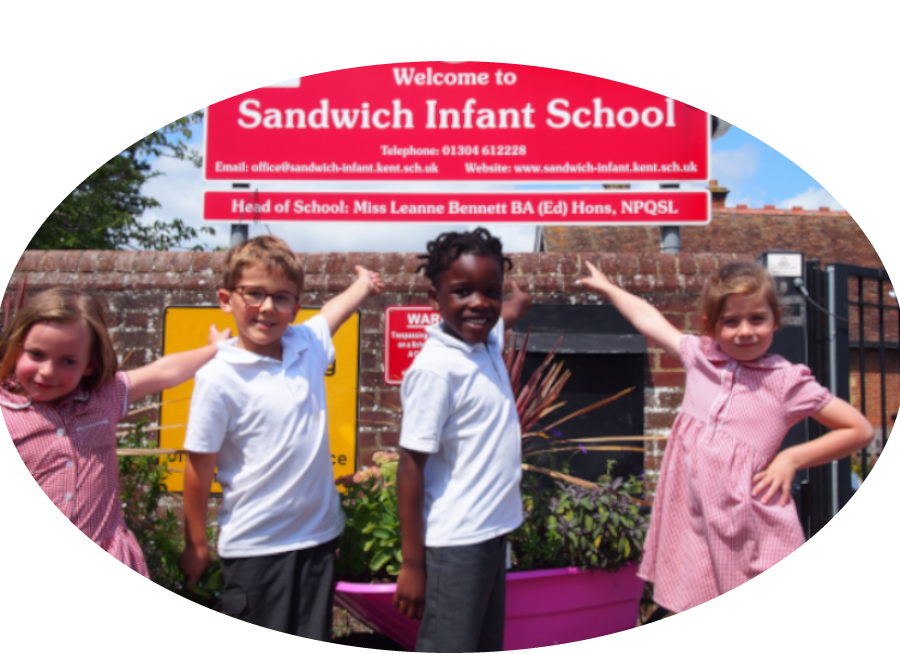At Sandwich Infant School, we understand how important speech, language, and communication skills are for every child’s learning, emotional wellbeing, and social development. These skills are the building blocks for success at school and beyond — helping children to build friendships, express their needs, and achieve their potential.
What is speech, language and communication?
• Speech is the act of producing sounds that form words, allowing us to communicate verbally. It involves the physical process of using our vocal cords, mouth, and breath.
• Language is the words and grammar used to communicate. It's how we express thoughts, ideas, and emotions, whether spoken, written, or signed.
• Communication is the process of sharing information, thoughts, and feelings between people. It can be verbal (speech), non-verbal (gestures, facial expressions), written, or visual.
What types of difficulty can children have?
There are many different types of speech, language and communication needs (SLCN). Some examples are:
1. Difficulties understanding language: Such as struggling to follow instructions, or understanding what words mean.
2. Expressive language difficulties: Difficulty using language to communicate.
3. Speech sound disorders: Difficulty producing speech sounds correctly.
4. Stammering (Stuttering): Disruptions in the flow of speech.
5. Social Communication Difficulties: Challenges with using language in social contexts, such as understanding non-verbal cues or taking turns in conversation.
Find out more here Speech, language, and communication needs - Kent County Council
How We Support Your Child
In Kent, we are using the Balanced System® to help everyone work together to support pupils’ speech, language and communication. This means everyone involved in a child’s life can work together in a more joined up-way with the speech and language therapy service. We work closely with our NHS link speech and language therapist, who regularly visits our school. They support us to review and develop our approach, advise staff, and work with individual pupils or small groups where needed.
Our current link therapist is Stephanie Mills — your child may see them in class, in groups, or around the school.
Our Commitment – The Five Strands of the Balanced System®
.png)
We are working to ensure that...
• We help parents and carers build the confidence, knowledge, and skills to support their child. Pupils are also encouraged to make choices about the support they receive (Family Support)
• We create communication-friendly classrooms and learning spaces where every child can understand and express themselves (Environment)
• Our staff are trained to spot speech, language, and communication needs and know how to support pupils effectively (Workforce)
• We identify any needs as early as possible so children get the help they need quickly (Identification)
• Where needed, we provide specific support to help children make progress (Intervention)
Levels of Support Available
Every child benefits from support at different levels. Some may need more targeted or specialist help at times in addition to universal support:
• Universal Support – For all pupils. For example, using visual aids, clear instructions, and communication-friendly teaching strategies.
• Targeted Support – For pupils who need extra help. This could include small group work or pre-teaching key vocabulary.
• Specialist Support – For pupils with more complex needs. For example, therapy for a child with a complex speech sound disorder
Our Current Focus
Over the past year, we have been working on developing supportive whole school strategies that support non-verbal children. There has been a big focus on the use of Makaton, communication boards and visuals.
For more information about the Balanced System® in schools and how speech and language therapy services are working, visit KELSI.
If You Have Concerns
If you have any concerns about your child’s speech, language or communication skills, please speak to your child’s class teacher first. We will then work together to agree on the next steps.
If necessary, we may discuss your child’s needs with our link therapist and develop a plan. You will be kept informed about any plans to support your child.
An important principle of the Balanced System® is ensuring that what matters most to you and your child is central to agreeing on outcomes and setting targets.
Useful websites for parents
Speech, language, and communication needs - Kent County Council (general information about SLCN in Kent including how to access support)
The Pod - KCHFT – (information and resources including workshops delivered by Kent speech and language therapists)
BBC Tiny Happy People (advice and activities for all parents to support speech, language and communication development, up to age 5).
Home - Speech and Language UK: Changing young lives (national charity, lots of information on typical development, resources and advice translated into different languages)
SLCN - Afasic (national charity – information and resources)
RADLD - Raising Awareness of Developmental Language Disorder - RADLD
Parent Portal - Speech and Language Link (information about development and activities to support including for teenagers)
Words for Life | National Literacy Trust | Words for Life (parent advice to support language, literacy and communication for up to 12 years)
The Balanced System® in Kent for Speech Language and Communication Needs (SLCN) – KELSI (information aimed at schools and professionals, but may be of interest to parents wanting to understand how the Balanced System works in more detail)






